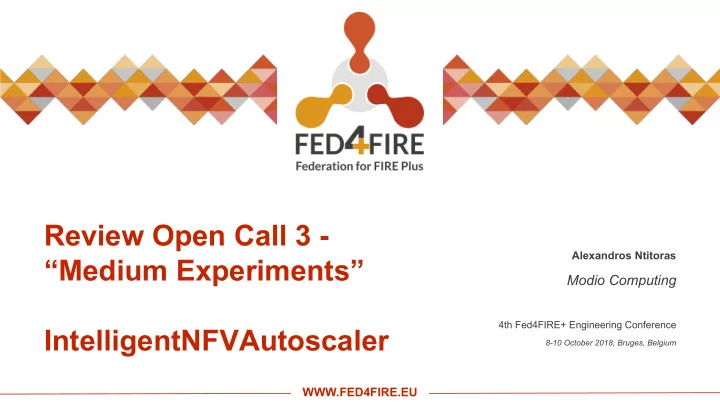

Review Open Call 3 - Alexandros Ntitoras “Medium Experiments” Modio Computing 4th Fed4FIRE+ Engineering Conference IntelligentNFVAutoscaler 8-10 October 2018, Bruges, Belgium WWW.FED4FIRE.EU
Outline Experiment description. • Project results. • Business impact. • Feedback. • 2 WWW.FED4FIRE.EU
Experiment description (1/3) CONCEPT AND OBJECTIVES Concept : Add ‘predictive’ functionality to Kubernetes • autoscaler in order to proactively scale-in/out resources. Objectives : • Leverage CPU load forecasts for Kubernetes predictive autoscaling. Comparison of Kubernetes stock and predictive autoscaling policies with various WebRTC load patterns. 3 WWW.FED4FIRE.EU
Experiment description (2/3) BACKGROUND AND MOTIVATION Background : We have validated that our predictive • autoscaling approach outperforms OpenBaton. Motivation : Market our predictive autoscaling approach for • NFV 5G environments. 4 WWW.FED4FIRE.EU
Experiment description (3/3) EXPERIMENT SET-UP Step 1 Step 2 Step 3 Step 4 WebRTC Scenario Client & Server- Load Reconfiguration of Execution Side Monitoring Forecasting K8S Autoscaler GKE (Google Cloud) IMEC Cloud Headless Chrome Agent Kubernetes Kubernetes Node Node TURN Scenario Executor Headless Chrome Server Agent Monitoring Agent Kubernetes Master Headless Chrome Agent Forecasting & Monitoring Agent Autoscaling Agent 5 WWW.FED4FIRE.EU
Project results (1/3) MEASUREMENTS 6 WWW.FED4FIRE.EU
Project results (2/3) MEASUREMENTS 20-30% energy saving through proactive shutdown of idle Pods • during the scale-in phase. 5-15% QoS improvement in terms of ‘good sessions’ during the • scale-out phase. Holt Winters has performed better than i) ARIMA and ii) Recurrent • Neural Networks in the majority of experiments. 7 WWW.FED4FIRE.EU
Project results (3/3) LESSONS LEARNT Predictive autoscaling outperforms default Kubernetes autoscaler. • Energy saving and QoS improvement of client services are two • important dimensions of our Value Proposition and both have been validated over Fed4FIRE+. Plenty of room for experimentation with additional services, load • patterns and machine learning algorithms. Same methodology can be applied to 5G use cases demanding • intelligent resource provisioning within an NFV cloud. 8 WWW.FED4FIRE.EU
Business impact (1/4) IMPACT ON MODIO’S BUSINESS This experiment allowed us to move from a small-scale Proof • of Concept demonstration over OpenBaton to an enhanced implementation and demonstrator for Kubernetes. Given that there is no competitor in the market, this project • directly helps us in our VC raising activities to develop a Minimum Viable Product that will enter the 5G NFV market. 9 WWW.FED4FIRE.EU
Business impact (2/4) HOW FED4FIRE+ HELPED US The project’s measurable outcomes (energy saving upon scale-in, • QoS improvement upon scale-out) have helped us in strengthening our Value Proposition (VP). Leveraging the demonstrator and its obtained outcomes, we will soon • be contacting VCs to raise backing for developing our MVP. The obtained measurements shall be included in our patent for • predictive autoscaling for Kubernetes. 10 WWW.FED4FIRE.EU
Business impact (3/4) VALUE PERCEIVED Our primary goal is not to market our solution as a standalone • software product, but through a licensing scheme. Discussions with potential clients are still needed to derive an estimated perceived business value, based on our experiment’s outcomes: • Energy saving for the operator; • Better services offered to the end user. 11 WWW.FED4FIRE.EU
Business impact (4/4) WHY WE CAME TO FED4FIRE+ To compile a demonstrator which we shall use for further VC • backing. Approval from a recognised H2020 Future Internet project • carries weight in the industrial community. Prior experience from our WiSHFUL open call project where • we worked with the iMinds testbed. 12 WWW.FED4FIRE.EU
Feedback (1/4) USED RESOURCES AND TOOLS jFed tool and RSpec files for the provisioning of client • resources. Virtual Wall Virtual Machines running multiple concurrent • headless Chrome WebRTC sessions. Kubernetes cluster provisioned through Rspec for initial testing • of the Kurento Kubernetes deployment and metrics monitoring. 13 WWW.FED4FIRE.EU
Feedback (2/4) ADDED VALUE OF FED4FIRE+ Offered us additional resources, technical, financial support • and reduced total experiment cost. Automated and repeatable deployments through jFed/RSpec • allowed for faster experimentation setup time thus allowed more experiments to be carried out, overall boosting productivity. 14 WWW.FED4FIRE.EU
Feedback (3/4) ADDED VALUE OF OUR EXPERIMENT TO FED4FIRE+ We provide a reference implementation of predictive • autoscaling. Our core features are not tied to any specific algorithm. • Our autoscaling agent for Kubernetes can reused by • consequent experimenters wishing to explore predictive NFV resource management. 15 WWW.FED4FIRE.EU
Feedback (4/4) TESTBED ISSUES DURING EXPERIMENTATION Complexities related to IPv6 & ICE support in Kubernetes led • to the provisioning of an external STUN/TURN server and Kubernetes cluster. 16 WWW.FED4FIRE.EU
WWW.FED4FIRE.EU This project has received funding from the European Union’s Horizon 2020 research and innovation programme, which is co-funded by the European Commission and the Swiss State Secretariat for Education, Research and Innovation, under grant agreement No 732638.
Recommend
More recommend